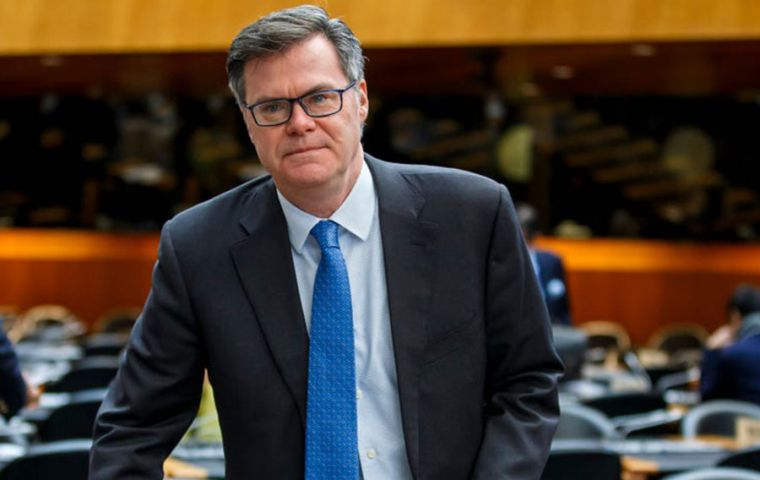MercoPress. South Atlantic News Agency
Fishing subsidies battle at WTO speared by the US
 “In a way, it won’t be the WTO that saves the fish, it’ll be the fish that save the WTO,” Shea told an event hosted by the Asia Society think tank in Washington
“In a way, it won’t be the WTO that saves the fish, it’ll be the fish that save the WTO,” Shea told an event hosted by the Asia Society think tank in Washington The United States said on Thursday it was pushing hard for the World Trade Organization to reach agreement on cutting fishing subsidies in coming months and viewed those talks as a test of whether the global body can still achieve multilateral deals.
Deputy U.S. Trade Representative Dennis Shea, the U.S. envoy to the Geneva-based WTO, said a successful outcome would have “enormous importance” for the body but that there were still significant challenges ahead.
“In a way, it won’t be the WTO that saves the fish, it’ll be the fish that save the WTO,” Shea told an event hosted by the Asia Society think tank in Washington. Despite the challenges, Shea said he hoped a fishing subsidies deal could be struck in time for a WTO meeting in Kazakhstan in June.
Reaching a deal would contribute to the sustainability of the world’s oceans and meet targets set by world leaders, while providing new momentum for the WTO, he said.
“As the only active multilateral negotiation at the WTO, it will also be a test whether the institution is still capable of achieving meaningful multilateral outcomes,” Shea said.
Experts said global fish stocks could collapse unless a deal is reached soon to ban harmful fisheries subsidies worth over US$ 30 billion annually. More than 90% of fish stocks are overfished or at maximum sustainable levels, according to the U.N. Food and Agriculture Organization.
Negotiators are battling over claims for carve-outs by some big players such as South Korea, the European Union and China, which is under fire from Washington for claiming exemptions intended for developing nations.
WTO Director General Roberto Azevedo said this week he agreed with U.S. officials about the need for structural changes at the WTO to reflect global economic developments, including the rise of China and emergence of the digital economy.
To make its point, Washington has been blocking appointments to the WTO’s appeals body for two years, leaving it with too few members to make rulings. The WTO initially hoped to reach an agreement on the issue by the end of 2019.
Shea said some countries remained more focused on protecting their fisheries subsidies than reducing or eliminating them. Many others did not submit required notifications on subsidies.
He said the United States and other partners had submitted five proposals to achieve meaningful reductions in harmful subsidies.




Top Comments
Disclaimer & comment rulesCommenting for this story is now closed.
If you have a Facebook account, become a fan and comment on our Facebook Page!